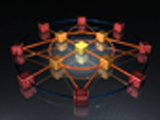IMDEA Networks

Information Centric Networking: Addressing Information at the Network Level

Antonio Carzaniga, Professor, Faculty of Informatics, USI--Università della Svizzera italiana, Switzerland
External Presentation (External Speaker)
Imagine a network in which you address information: literally, packet-level addressing of *information* rather than hosts. For example, you may request the front page of El País with a request packet addressed to “the front page of El País”! Then the network forwards the request to some server that can produce the right data (possibly cached) and then delivers that data back to you. You don’t have to figure out where that information is; the network does that for you. Or you may announce a talk with an announcement packet addressed to whomever is interested in the topics of the talk. Then the network delivers it to anyone and everyone interested. You don’t have to keep track of who might be interested, nor do you have to send many copies of your announcement. An information centric networking would do all of that for you.
An information centric network would offer a rich service that is ideal for many applications. But would that scale? Would it even work? How? In this talk I will present some basic ideas on how to architect a rich and expressive information-centric network. I will focus primarily on routing and forwarding.
About Antonio Carzaniga
Antonio Carzaniga is a professor in the Faculty of Informatics at USI–Università della Svizzera italiana, Switzerland, which he joined as an assistant professor when the Faculty was founded in 2004. From 2001 to 2007 he was also an assistant research professor in the Department of Computer Science at the University of Colorado at Boulder. Antonio Carzaniga received the Laurea degree in electronics engineering and the Ph.D. degree in computer science from Politecnico di Milano, Italy.
Antonio Carzaniga’s primary research interests are in the two areas of distributed systems and software engineering, specifically in content-based networking, information-centric networking, distributed publish/subscribe systems, middleware, software adaptability and automatic fault tolerance, and testing. He also conducted research in software configuration management and code mobility.
This event will be conducted in English

